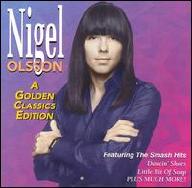Olsson had released a solo album in 1971 called Nigel Olsson's Drum Orchestra and Chorus and in the wake of his departure from John's group, he cut a self-titled album for John's Rocket label. Another eponymous effort followed for Columbia in 1978 and after a switch to Bang, Olsson scored a hit single in 1979 with Dancin' Shoes (from the album Nigel). 1980 saw the release of a follow-up LP, Changing Tides, as well as Olsson's membership in the Tremblers, a group uniting Peter Noone of Herman's Hermits fame with the Captain Tennille's Daryl Dragon. Also that year, Olsson and Murray were invited to rejoin John's touring band, where they remained until 1984. Despite extensive session work throughout the '70s, Olsson was far less active in that area during the '80s, spending more time on writing and producing. In 1991, he and ex-John guitarist Davey Johnstone formed the group Warpipes, which released the album Holes in the Heavens the following year before breaking up when their label went bankrupt. Olsson spent much of the '90s away from music, aside from the occasional recording session, but in 2000 he rejoined John's band once again and the following year he released a sequel to his debut, Nigel Olsson's Drum Orchestra and Chorus Vol. 2: Move the Universe. ~ Steve Huey, Rovi
Nigel Olsson
from Merseyside, England
February 10, 1949 (age 76)
Biography
Best-known as the drummer in Elton John's early-'70s backing band, Nigel Olsson was born February 10, 1949, in the small Cheshire (now Merseyside) town of Wallasey, England. As a teenager, he lived in Sunderland, where he sang lead in a group called the Fireflies and took up the drums when their regular drummer quit. At 17, he and good friend Mick Grabham successfully auditioned for the psychedelic pop band Plastic Penny, which released two albums from 1968-1969 and scored a hit with Everything I Am before disbanding. Olsson subsequently joined the Spencer Davis Group, which was reeling from the defection of frontman Stevie Winwood; the gig was short-lived as Davis broke up the band before the end of 1969, but Olsson met bassist Dee Murray, who would become his favorite rhythm section partner. Looking for work, Olsson filled the drum slot in Uriah Heep for part of the 1970 debut album Very 'eavy, Very 'umble, but soon left to concentrate on session work. He and Murray had been playing with Elton John on the young singer/songwriter's demos and they both joined his touring group in the spring of 1970. Olsson played on most of John's early-'70s classics, including Honky Chateau, Don't Shoot Me I'm Only the Piano Player, Goodbye Yellow Brick Road, and Captain Fantastic the Brown Dirt Cowboy. After the latter was released in the spring of 1975, John sought to shake up his backing band by replacing both Olsson and Murray.
Top Tracks
Albums
Videos
Close















